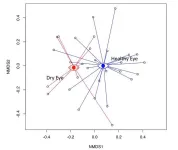(Press-News.org) Implementing a single shared digital prescribing record across the NHS in England could avoid nearly 1 million drug errors every year, stopping up to 16,000 fewer patients from being harmed, and saving up to 22 lives every year, suggests a modelling study, published online in BMJ Quality & Safety.
The figures, which are based on the assumption that such a system could reduce medication errors by at least 10%, and by as much as 50%, could also save £millions for the NHS, say the researchers.
Previously published research suggests that drug errors cost the NHS £98 million every year, consuming over 180,000 bed days, and contributing to around 1700 deaths.
A major nationwide initiative is currently under way across NHS health and social care to enable different information systems to share data digitally, often referred to as system interoperability, explain the researchers.
But as yet, there’s no evidence to show what impact this would have on patient safety, so, at the behest of NHS England, the researchers set out to estimate the current extent and consequences of drug errors associated with information transfer within the NHS in England, and how effective system interoperability might be in reducing them.
In the absence of routinely collected data on drug errors in the NHS, the researchers drew on published evidence and third party expertise to estimate the annual prevalence, associated patient harm, and NHS costs of undetected drug errors as patients transition through care.
The researchers focused on errors that are most likely to occur when someone has to manually transfer prescription information: omitted medicines; extra and duplicated medicines; wrong dose, frequency, timing, or formulation; and medicines intended for immediate/short term use but prescribed for long term use instead.
The care transition points studied were: hospital admission from primary care; hospital discharge into primary care; transfer from one hospital to another for inpatient or outpatient care; and transfers between departments/clinics within the same hospital.
Associated hospital admission and inpatient treatment, length of hospital stay, and death were used to reflect patient harms, as these were the only objective measures of harm that could be estimated from the available data.
National data sources for England were used to estimate costs, which were reported for the cost year 2020-21.
The total annual number of undetected drug errors was estimated to affect around 1.8 million prescription items at transitions of care in hospitals in England.
Of these, over half (52%) happened when patients were admitted to hospital, and 44% when they were discharged; 3% occurred during transfers from one hospital to another; and 1% occurred during transfers within the same hospital.
These errors were estimated to affect around 380,000 episodes of patient care, resulting in avoidable harms to 31,500 patients, 36,500 additional bed days at a cost of around £17.8 million to the NHS, and more than 40 deaths.
Based on these figures, the researchers estimated that for every 10% reduction in the number of drug errors during transitions of care, there would be at least 3000 fewer episodes of associated patient harm and at least 3500 fewer bed days needed, saving the NHS nearly £1.8 million, and 4 lives every year.
And if the implementation of a single shared digital prescription record halved the number of these errors, there could be around 1 million fewer drug errors during transitions of care, up to 16,000 fewer people experiencing associated harms, and more than 20 lives saved every year, estimate the researchers.
The researchers acknowledge that they had to make various assumptions in their calculations, given that there’s little data on drug errors and their consequences, and couldn’t include key care transitions, such as to and from care homes and mental health facilities.
But given this, their figures are likely to be underestimates, they suggest, and conclude that “an interoperable prescription information system has the potential to substantially reduce transition medication error prevalence, associated harm, and healthcare costs.”
There are likely to be other benefits too, including healthcare professional time saved, improved patient experience and care quality, quicker discharge, and enhanced medicines optimisation across organisations, they say.
“The widespread adoption and active use of interoperable systems across the NHS will be pivotal to realising the benefits of interoperability and a key step towards the ultimate aim of having one patient-centred consolidated medication record, to which there will be fully interoperable access,” they add.
END
Shared digital NHS prescribing record could avoid nearly 1 million annual drug errors
Avoiding 16,000 patient harms and saving 20+ lives and £millions for services in England
2024-03-27
ELSE PRESS RELEASES FROM THIS DATE:
Stanford Medicine-designed AI tools tackle soft tissue sarcomas, identify new treatment strategies
2024-03-26
Using novel machine learning tools developed at Stanford Medicine, researchers have mapped three distinct cellular configurations that correspond to clinical outcomes for patients with a rare, difficult-to-treat cancer called soft tissue sarcoma.
In particular, the technique identified a cellular neighborhood that correlated with a positive response to immunotherapy, which may help physicians make treatment decisions.
“These cancers are challenging,” said Everett Moding, MD, PhD, an assistant professor of radiation oncology. “Up to half of patients diagnosed with a primary tumor will develop distant metastases, but we don’t have a good way to predict ...
ARPA-H awards Columbia researchers nearly $39M to develop a living knee replacement
2024-03-26
A team of researchers from Columbia University Irving Medical Center (CUIMC) and Columbia Engineering has been awarded up to a $38.95 million contract from the Advanced Research Projects Agency for Health (ARPA-H) to build a living knee replacement from biomaterials and human stem cells, including a patient’s own cells. ARPA-H is a federal funding agency that funds transformative biomedical and health research breakthroughs, rapidly translating research from the lab to applications in the marketplace.
The Award
The award, part of the ARPA-H’s Novel Innovations for Tissue Regeneration ...
How genes work together to shape how much you smoke
2024-03-26
Take a puff of nicotine for the first time, and your DNA plays an important role, alongside social and environmental factors, in shaping what happens next.
In recent years, scientists have identified thousands of genetic variants believed to influence everything from when people first try smoking to how good that first cigarette feels to how often they light up and how hard it is to quit. Some variants influence how quickly we metabolize nicotine, while others underlie how sensitive we are to it. But little is known about how they interact with each other and with other genetic differences.
A new University of Colorado Boulder study sheds unprecedented ...
University of Oklahoma engineer receives NSF CAREER Award to advance gas sensing technologies
2024-03-26
NORMAN, OKLA. – Binbin Weng, Ph.D., an engineering professor at the University of Oklahoma, has been awarded a National Science Foundation CAREER Award presented to early-career faculty with the potential to serve as academic role models in research and education. The $497,370 grant will fund his project “Enabling New States of Light in Mid-Wave Infrared Photonics for Gas Sensing Applications.”
Weng says there is a growing demand for distributed gas sensing networks capable of continuously monitoring gas threats on a broad scale. However, current technologies face significant challenges in size, power consumption ...
More than meets the eye: Researchers uncover the microbial secrets of dry eye
2024-03-26
Researchers have used advanced sequencing technology to determine how the mix of microbes present in patients with healthy eyes differs from the mix found in patients with dry eye. The new work could lead to improved treatments for various eye problems and for diseases affecting other parts of the body.
Microbial communities in and on our body — collectively referred to as the human microbiota — play an essential role in keeping us healthy. Although many studies have focused on microbial communities in our gut, understanding the microbiota present in other body sites is critical for advancing our knowledge of human health and developing targeted interventions ...
Researchers identify microbes that help plants thwart parasite
2024-03-26
Bacteria that could help one of Africa’s staple crops resist a major pest have been identified by researchers at the University of California, Davis. Their findings, published March 26 in Cell Reports, could improve yields of sorghum, a mainstay of food and drink in West and East African countries.
About 20 percent of Africa’s sorghum crop is lost due to witchweed (Striga hermonthica), a parasitic plant that steals nutrients and water by latching onto the plant’s roots.
In the new study, UC Davis researchers show that soil microbes induce changes in sorghum roots that make the plant more resistant to infection by witchweed. They ...
Late surgical repair for preterm babies born with inguinal hernia shows better results compared to early repair, study finds
2024-03-26
Delaying surgical inguinal hernia repair in preterm infants until after discharge from the neonatal intensive care unit (NICU) appears to reduce the likelihood of serious adverse events, according to researchers at UTHealth Houston.
A study led by first and corresponding author Martin L. Blakely, MD, MS, MMHC, professor of surgery and pediatrics with McGovern Medical School at UTHealth Houston, analyzed the safety of early versus late surgical repair for preterm infants born with an inguinal hernia. The findings were published today in the Journal of the American Medical Association (JAMA).
“The biggest question we wanted ...
Two plant extracts with potential as GLP-1 agonist weight loss pills are identified by AI-based analysis
2024-03-26
*Note - This is an early press release from the European Congress on Obesity (ECO 2024) Venice 12-15 May. Please credit the Congress if using this material*
Two plant compounds with potential as GLP-1 agonist weight loss pills have been identified in an AI (artificial intelligence)-based study, the European Congress on Obesity (ECO 2024) (Venice 12-15 May), will hear.
Glucagon-like peptide-1 (GLP-1) receptor agonists such as semaglutide and tirzepatide are highly effective at helping people lose weight. By mimicking the action of a hormone ...
nTIDE March 2024 deeper dive: Gender employment gap narrows among people with disabilities post-COVID
2024-03-26
East Hanover, NJ – March 26, 2024 – The shifting landscape of post-COVID-19 employment highlights a reduction in the gender employment gap among individuals with disabilities, a trend not observed among those without disabilities, according to last Friday’s National Trends in Disability Employment (nTIDE) Deeper Dive Lunch & Learn Webinar.
While men and women with disabilities have similar rates of employment, the data do not address whether women with disabilities in the workforce have lower-quality ...
New genetic analysis tool tracks risks tied to CRISPR edits
2024-03-26
Since its breakthrough development more than a decade ago, CRISPR has revolutionized DNA editing across a broad range of fields. Now scientists are applying the technology’s immense potential to human health and disease, targeting new therapies for an array of disorders spanning cancers, blood conditions and diabetes.
In some designed treatments, patients are injected with CRISPR-treated cells or with packaged CRISPR components with a goal of repairing diseased cells with precision gene edits. Yet, while CRISPR has shown ...
LAST 30 PRESS RELEASES:
New knowledge on heritability paves the way for better treatment of people with chronic inflammatory bowel disease
Under the Lens: Microbiologists Nicola Holden and Gil Domingue weigh in on the raw milk debate
Science reveals why you can’t resist a snack – even when you’re full
Kidney cancer study finds belzutifan plus pembrolizumab post-surgery helps patients at high risk for relapse stay cancer-free longer
Alkali cation effects in electrochemical carbon dioxide reduction
Test platforms for charging wireless cars now fit on a bench
$3 million NIH grant funds national study of Medicare Advantage’s benefit expansion into social supports
Amplified Sciences achieves CAP accreditation for cutting-edge diagnostic lab
Fred Hutch announces 12 recipients of the annual Harold M. Weintraub Graduate Student Award
Native forest litter helps rebuild soil life in post-mining landscapes
Mountain soils in arid regions may emit more greenhouse gas as climate shifts, new study finds
Pairing biochar with other soil amendments could unlock stronger gains in soil health
Why do we get a skip in our step when we’re happy? Thank dopamine
UC Irvine scientists uncover cellular mechanism behind muscle repair
Platform to map living brain noninvasively takes next big step
Stress-testing the Cascadia Subduction Zone reveals variability that could impact how earthquakes spread
We may be underestimating the true carbon cost of northern wildfires
Blood test predicts which bladder cancer patients may safely skip surgery
Kennesaw State's Vijay Anand honored as National Academy of Inventors Senior Member
Recovery from whaling reveals the role of age in Humpback reproduction
Can the canny tick help prevent disease like MS and cancer?
Newcomer children show lower rates of emergency department use for non‑urgent conditions, study finds
Cognitive and neuropsychiatric function in former American football players
From trash to climate tech: rubber gloves find new life as carbon capturers materials
A step towards needed treatments for hantaviruses in new molecular map
Boys are more motivated, while girls are more compassionate?
Study identifies opposing roles for IL6 and IL6R in long-term mortality
AI accurately spots medical disorder from privacy-conscious hand images
Transient Pauli blocking for broadband ultrafast optical switching
Political polarization can spur CO2 emissions, stymie climate action
[Press-News.org] Shared digital NHS prescribing record could avoid nearly 1 million annual drug errorsAvoiding 16,000 patient harms and saving 20+ lives and £millions for services in England





